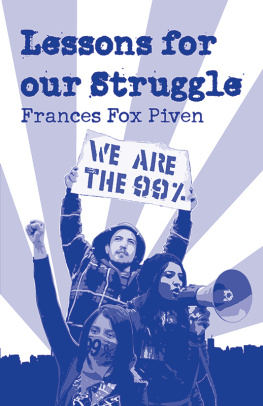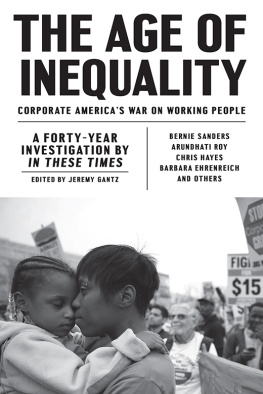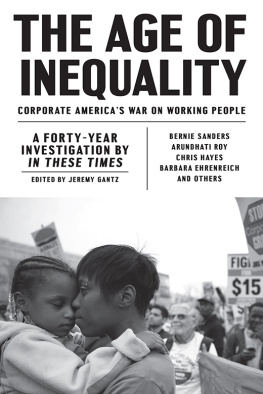Frances Fox Piven - Lessons for Our Struggle
Here you can read online Frances Fox Piven - Lessons for Our Struggle full text of the book (entire story) in english for free. Download pdf and epub, get meaning, cover and reviews about this ebook. year: 2012, publisher: Haymarket Books, genre: Politics. Description of the work, (preface) as well as reviews are available. Best literature library LitArk.com created for fans of good reading and offers a wide selection of genres:
Romance novel
Science fiction
Adventure
Detective
Science
History
Home and family
Prose
Art
Politics
Computer
Non-fiction
Religion
Business
Children
Humor
Choose a favorite category and find really read worthwhile books. Enjoy immersion in the world of imagination, feel the emotions of the characters or learn something new for yourself, make an fascinating discovery.
- Book:Lessons for Our Struggle
- Author:
- Publisher:Haymarket Books
- Genre:
- Year:2012
- Rating:3 / 5
- Favourites:Add to favourites
- Your mark:
- 60
- 1
- 2
- 3
- 4
- 5
Lessons for Our Struggle: summary, description and annotation
We offer to read an annotation, description, summary or preface (depends on what the author of the book "Lessons for Our Struggle" wrote himself). If you haven't found the necessary information about the book — write in the comments, we will try to find it.
Piven has embodied the best of American democracy.The Nation
Frances Fox Piven reminds us why we must understand the labor, civil-rights, and anti-imperialist struggles of the Depression era if we are going to advance the struggles of the present.
Frances Fox Piven is the author of many important books.
Lessons for Our Struggle — read online for free the complete book (whole text) full work
Below is the text of the book, divided by pages. System saving the place of the last page read, allows you to conveniently read the book "Lessons for Our Struggle" online for free, without having to search again every time where you left off. Put a bookmark, and you can go to the page where you finished reading at any time.
Font size:
Interval:
Bookmark:
Lessons for our Struggle
2011 by Frances Fox Piven
Published 2012 by Haymarket Books
PO Box 180165
Chicago, IL 60618
773-583-7884
www.haymarketbooks.org
info@haymarketbooks.org
Trade Distribution:
In the US, Consortium Book Sales and Distribution, www.cbsd.com
In Canada, Publishers Group Canada, www.pgcbooks.ca
In the UK, Turnaround Publisher Services, www.turnaround-uk.com
In Autralia, Palgrave Macmillan, www.palgravemacmillan.com.au
All other countries, Publishers Group Worldwide, www.pgw.com
ISBN: 978-1-60846-229-2
Library of Congress Cataloging-in-Publication data is available
Occupy Together
SOME OF US have been waiting for the rise of protest movements in the United States. After all, conditions seemed to demand it. On the one hand, there were the millions of unemployed, still more millions losing their homes and their nest eggs, along with the long-term decline in the earnings of working people and the growing numbers of people who were thrown into desperate poverty, even as programs that were supposed to protect people when times were hard were being slashed. On the other hand, events were exposing the role of the corporate elite, and especially the financial elite, in causing these developments. After all, had these economic calamities been due to forces beyond anyones control, people probably would have simply tightened their belts, worried, and maybe prayed. But they wouldnt have risen in anger at the 1 percent. However, when the financial crisis occurred, the 1 percent overreached. They demanded huge bailouts with taxpayer monies, insisted on more wage cuts and public budget cuts, and then proudly reported a new spurt of rising profits and huge bonuses, especially in the financial sector.
Meanwhile, the long-term increase in poverty in the United States and the long-term decline of the earnings of middle America continued and grew worse. Then, with their own bottom lines safe, at least for the moment, business leaders and their right-wing allies took a new tack. Their formula for economic recovery was not bailouts but fiscal austerity. Taxes on top earners they argued would be bad for the economyjob killer, they screamed at such proposals. They were adamant in resisting debt relief for millions of homeowners facing foreclosure (moral hazards they had the gall to call such relief), or for the students whose debts had soared even while they faced a jobless future. Instead they pushed for more punishment for the mass of Americans in the form of job and pension cuts in the public sector, as well as cuts in what remained of the safety net. As for the double dealing and criminality exposed by the financial crisis, well, there was no point in pestering the past our leaders told us.
This was all simply too much for many people to swallow quietly. In effect, the financial meltdown and the mix of greed and irresponsibility with which our political and economic leaders responded created a crisis of legitimacy.
In particular, attention turned to Wall Street. Financial capitalists have clearly been in the drivers seat in the United States and across the globe. Only consider who it is that European publics confront as they deal with problems of debt, or who Latin American and Asian publics confronted not long ago. In the past, finance has sometimes been seen as the mind of capitalism. But if finance has a mind, it was now a mind that was entirely self-seeking, with no responsibility for the body, with no firm attachment or accountability to the society and the world it was steering. As events made this failure of accountability more and more apparent, and hardships worsened, people began to question the authority of the elites we usually think know best, and who we accept as moral leaders.
So I think lots of us waited and wondered. What was going to happen? Were the millions of people who were being squeezed by the economic crisis and the abuses that followed going to accept their fate, or were they going to try to change the course of events? True, there were earlier moments in American history when the people had taken to the streets, occupied the factories, and made an imprint, a big imprint, on our politics and policies. But maybe the technical complexity of the American political economy, combined with the sheer volume of propaganda that is produced by American politics, would smother popular outrage. Maybe popular capacities for politics had been smothered. It was hard to be sure.
And then in September 2011 Occupy Wall Street (OWS) began. It was rather small at first, especially in comparison with past movements, or at least in comparison with our images of those movements. There were only a few hundred of the young and some not so young who were willing to contemplate sleeping on the concrete. But it turned out to be a brilliant move. From the outset the symbols of the Occupiers resonated with lots of people, no matter that at first the media either ignored them or scoffed at them. The Occupiers had simply named Wall Street as the heart of the system, the target of their protests, and therefore the place we should all occupy. The truth of that was inescapable.
An occupation was itself a smart and innovative idea. To be sure, movements in the past have undertaken sit-ins, and a sit-in is after all an occupation. But usually protest movements think first of marches and rallies. We know we have a movement when people parade together holding banners aloft through the streets to some central place. (Actually, in New York City, it is difficult to march together or to convene in a central place. Most marches are divided up by the police, denied permits to use the roadway, and barred from City Hall Park, once the destination of protestors.) We recognize movements also because movements stage rallies, again with banners and chants and so on. However, a march or a rally lasts only a few hours, and the authorities can simply wait it out. Its fun for us, and also easy for them. But once the march or rally is over, it is over, and the indignation and the defiance that power the action may well fade. An occupation, even of a small area, is different. Its not going to be over in three hours, three days, three months, maybe not in three years. Moreover, while the occupation continues it becomes the physical center of the movement and that allows people to congregate and get the news. This is exactly what happened at Liberty Plaza, and then at other occupations across the country and across the globe.
And the theme is brilliant as well. The slogan is inclusive. We are the 99 percent captures the basic idea that its a small handful of people who are despoiling our society and our planet at the expense of the rest of us, and that is why we are protesting. The message resonated, and more people flocked to the occupation sites. And the occupiers also exerted themselves to broaden their reach, to Occupy Together they said, and they invited people to join them. They reached out to the somnolent and discouraged unions in New York City, to airplane pilots and veterans. And they welcomed the homeless who were attracted to the occupations. So, in effect, OWS had a communication and outreach strategy, and it was effective. The occupations are continuing to spread and multiply.
Im especially hopeful about the slogan Occupy Together. Weve been through several decades when a lot of our politics have taken the form of discovering our distinctive identities, discovering, in other words, our separateness. Those discoveries have been very restorative I think for the most marginalized people in the society, especially groups whose distinctive oppression is rooted in ideas about nature and biology. That certainly includes women, African Americans and other racial groups, and to some extent also gays and lesbians. I think, in the long run, those movements will turn out to have been very useful. To be sure, they did not engage capitalism, which must be part of the reason for their successes. Nevertheless, they brought to the surface, and to the forefront of our political understanding, forms of oppression that we had been content to ignore or to naturalize as essentially biological in origin. But Occupy Wall Street signals to me that we may be at a stage where our commonalities, and the solidarity we can build on a recognition of our common humanity, has again become more important.
Font size:
Interval:
Bookmark:
Similar books «Lessons for Our Struggle»
Look at similar books to Lessons for Our Struggle. We have selected literature similar in name and meaning in the hope of providing readers with more options to find new, interesting, not yet read works.
Discussion, reviews of the book Lessons for Our Struggle and just readers' own opinions. Leave your comments, write what you think about the work, its meaning or the main characters. Specify what exactly you liked and what you didn't like, and why you think so.






